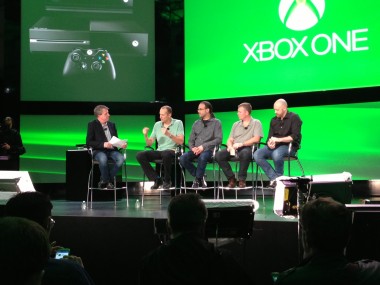Xbox One Design Started From a “Blank Slate”
 After the glitzy unveiling of the Xbox One this morning in Redmond, Microsoft dove into the technical details that it says make the new console a worthy successor to the Xbox 360.
After the glitzy unveiling of the Xbox One this morning in Redmond, Microsoft dove into the technical details that it says make the new console a worthy successor to the Xbox 360.
The short version of the pitch: The One is not an iteration; it’s a complete media overhaul.
“When you look at people who are watching media today … it’s a very dynamic world,” development director Boyd Multerer said during a panel discussion by Xbox team members. “We realized we had a real problem.”
Panelists described the console as starting from a “blank slate,” since the rise of both laptops and mobile devices as people’s preferred computing hardware happened after the Xbox 360 launched in 2005. Multerer said the company chose to start over rather than bank on the more advanced hardware in the Xbox One to carry it forward.
The biggest software-side change, as noted earlier, is the ability to use your voice to launch apps in tandem with one another (for example, to make a Skype call while you’re watching a movie). In other words, the Xbox One is competing with the “second screen” of phones or tablets by trying to give viewers the ability to multitask on their TV screens.
Basically, the One’s operating system is split into two sections: One resource-heavy partition for games, aimed at giving developers a predictable amount of power, and another partition running constantly in the background that can juggle multiple side apps for a “long period of time,” Multerer said.
Fellow panelist and Microsoft CVP Todd Holmdahl described the connected motion sensor, Kinect, as “completely redesigned from the ground up.” He said it has a 60 percent better field of view and the ability to detect much smaller objects, like fingers, which should make motion controls more accurate.









